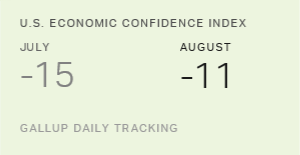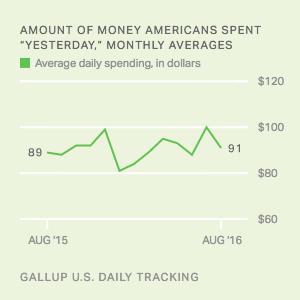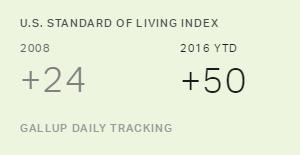Story Highlights
- Economic Confidence Index averages -11 in August, up from -15 in July
- Democrats' confidence rose in late July and remained higher in August
- Current conditions index at -2; Economic outlook index at -19
WASHINGTON, D.C. -- The Gallup U.S. Economic Confidence Index rose to a five-month high of -11 in August, up from -15 in July. This month's four-point gain notwithstanding, the index remains well below its post-recession high of +3 in January 2015 and is one point below this March's -10, the monthly high for 2016.
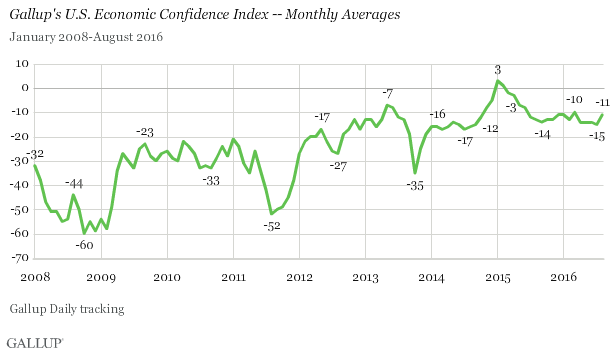
The recent uptick in Americans' confidence in the economy began in the final week of July when the index's weekly average rose six points to -10. Democrats' brighter assessments of the economy after the Democratic National Convention largely drove this increase, with their economic confidence growing 13 points to +28 in the last week of July. Democrats' higher level of confidence persisted throughout August. Meanwhile, Republicans saw no comparable gains in economic confidence over this time period.
Democrats' confidence in the economy held at that higher level in August, averaging +26 on Gallup's index, up from +13 for July. In contrast, Republicans' already low confidence slipped to -46 in August from -41 in July. Independents' confidence improved by four points in August but remained net negative at -14.
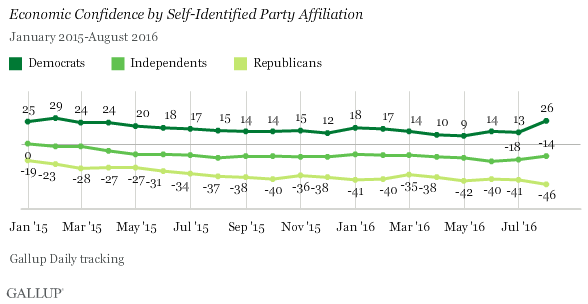
Americans More Positive About Economy's Current State Than Its Future Direction
Gallup's U.S. Economic Confidence Index is the average of two components: how Americans rate current economic conditions and whether they feel the economy is improving or getting worse. The index has a theoretical maximum of +100 if all Americans say the economy is doing well and improving, and a theoretical minimum of -100 if all Americans say the economy is doing poorly and getting worse.
In August, 27% of U.S. adults described the current conditions of the economy as "excellent," or "good," while 29% said conditions were "poor," yielding a current conditions index score of -2. This is up slightly from a current conditions score of -5 in July.
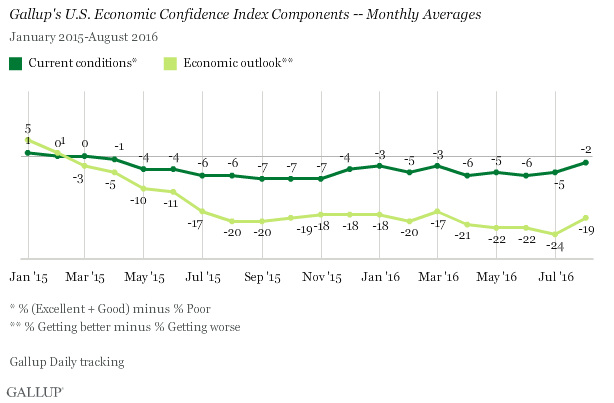
The economic outlook index rose in August to -19 from July's -24. The August outlook score reflects the 38% of Americans who said the economy was "getting better" and the 57% who said it was "getting worse."
Though the outlook score improved slightly in August, Americans' views of the direction of the economy remain low compared with the recent past: The outlook index has fallen from its apex of +5 in January 2015 to as low as -24 in July of this year and now stands at -19. By contrast, Americans' assessments of current economic conditions have remained relatively stable over this same time frame: The -2 score observed last month is only a few points below the January 2015 high of +1, and the index fell no lower than -7 in the intervening months.
There are many possible explanations for this drop in Americans' economic outlook, including the rebound in gas prices that began around the spring of 2015. Another possible reason is the uncertainty surrounding the 2016 presidential election -- both Democrats' and Republicans' economic outlook scores have fallen sharply since January 2015. Thanks to the post-DNC rally, however, Democrats' economic outlook is recovering.
These data are available in Gallup Analytics.
Survey Methods
Results for this Gallup poll are based on telephone interviews conducted Aug. 1-31, 2016, on Gallup Daily tracking, with a random sample of 15,175 adults, aged 18 and older, living in all 50 U.S. states and the District of Columbia. For results based on the total sample of national adults, the margin of sampling error is ±1 percentage point at the 95% confidence level. All reported margins of sampling error include computed design effects for weighting.
Each sample of national adults includes a minimum quota of 60% cellphone respondents and 40% landline respondents, with additional minimum quotas by time zone within region. Landline and cellular telephone numbers are selected using random-digit-dial methods.
Learn more about how the Gallup U.S. Daily works.
